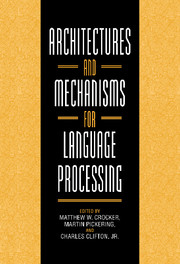Book contents
- Frontmatter
- Contents
- Contributors
- Preface
- 1 Architectures and Mechanisms in Sentence Comprehension
- Part I Frameworks
- Part II Syntactic and Lexical Mechanisms
- Part III Syntax and Semantics
- Part IV Interpretation
- 13 On Interpretation: Minimal ‘Lowering’
- 14 Focus Effects Associated with Negative Quantifiers
- 15 Constraints and Mechanisms in Theories of Anaphor Processing
- Author Index
- Subject Index
14 - Focus Effects Associated with Negative Quantifiers
Published online by Cambridge University Press: 03 October 2009
- Frontmatter
- Contents
- Contributors
- Preface
- 1 Architectures and Mechanisms in Sentence Comprehension
- Part I Frameworks
- Part II Syntactic and Lexical Mechanisms
- Part III Syntax and Semantics
- Part IV Interpretation
- 13 On Interpretation: Minimal ‘Lowering’
- 14 Focus Effects Associated with Negative Quantifiers
- 15 Constraints and Mechanisms in Theories of Anaphor Processing
- Author Index
- Subject Index
Summary
Introduction
Much of this book has explored the timing and effects of various processes which are initiated as a result of reading particular sentences or types of sentence. To understand the meaning of a sentence, we make use of information from sentence structure and content, but we also make use of information which the reader already has about the situation described. However, the role of such background knowledge in theories of natural language semantics varies between approaches to the problem. In this chapter, we will argue that semantic processing is at least partially driven by the inferences which the interpreter makes, and that the knowledge state of language users is therefore of paramount importance in the process of understanding discourse.
One possible approach to modelling the semantic processes involved in sentence comprehension is exemplified by the Discourse Representation Theory (DRT) account, which is based on a set-theoretic approach to reference (Kamp and Reyle, 1993). Solving reference and scope problems is central to DRT, because inadequate reference resolution leads to incoherence in the representation of a discourse. Thus, in DRT, reference resolution is the process which occurs earliest. There is little if any emphasis on inference and the utilisation of world knowledge in comprehension within such a framework, because the spirit of the approach is to try to capture the facts of language, independent of world knowledge.
- Type
- Chapter
- Information
- Architectures and Mechanisms for Language Processing , pp. 324 - 340Publisher: Cambridge University PressPrint publication year: 1999
- 1
- Cited by



